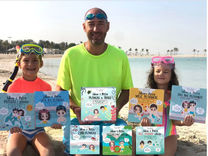How can swimming prepare children for school?
- Feb 7, 2022
- 4 min read
Swimming does not prepare children only for school, or the first grade, but for the whole life!
Unlike other "athletic disciplines", swimming is the only sport that is actually a life skill! Yes, the only sport that can directly save a child's life in the largest "playground" in the world - water. The ability of children to handle and adapt to the daily challenges of the environment from the earliest age, both in and around the water, is not a gift, but a skill that is learnt every day! The skill that children master from the earliest age and which makes many school obligations easier for them to handle in the future, without much parental interference.
Water itself is a great teacher, and swimming is its ally in having children mature. Swimming has multiple benefits for the proper development of children from an early age.
Swimming prepares children for school!
Exactly. Swimming children have better motor skills, they have better coordination through playing in the water, swimming, and that is directly related to the development of intelligence. Science underlines that children who swim from the age of three develop faster than their peers who don’t, and are unlikely to have difficulties in school. They achieve faster cognitive, physical and language development and are more focused, that is, their attention span is longer.
How will swimming help your child prepare for school?
Below are just some of the benefits that swimming provides to children who start school tomorrow:
1. Make decisions independently. Swimming prepares children for school by making it easier for them to understand the connection between cause and effect through a variety of situations. With swimming and safety skills in the water, children have a more vivid picture, but also the opportunity not to make a bad choice in the future, both for themselves and for the environment, regardless of whether they are in school or on a summer holiday. Swimming classes prepare children to successfully participate in formal learning when the time comes. In swimming lessons, they will learn to listen to the instructor, to follow instructions, to get on well with their peers, to address challenges, to put up with both success and failure - and much more. When they start with a preschool or school, they will already have an enviable background due to previous experience gained through swimming lessons.
2. Swimming children link various types of information more easily because with swimming from an early age, they develop the ability to think at higher levels of "water games". They react faster, more specifically, their thinking skills become progressively better. When the child is in the swimming class, watching and following the instructions of the swimming coach, he or she starts interpreting them and acting in accordance with what was said, also making language skills stronger. And when children are asked to count the strokes in swimming and make a connection between their movements and counting, they actually form the basis of mathematical thinking.
3. They come to a conclusion on their own. Swimming from the earliest age gives children the opportunity to learn to think in a critical way, but also to develop and improve analytical skills, because when they start school, it will be easier for them to "swim" on the dry.
4. Freedom of expression is of better quality. Water gives children an extra chance to express themselves, be more creative, but also more resourceful. Children who know how to swim, and have been swimming since the age of three, are more motivated than others, more creative in thinking and expressing themselves. Water is such a "playground" that can confuse even the freest children. When the children learn how to swim and how to express themselves through swimming, they will easily present themselves in the classroom with new friends later, and they will also feel free to ask for clarifications when they don’t understand something.
5. The movements are more accurate. With continuous swimming at an early age, certain hand movements become more accurate, which later makes it easier for children to write, hold a pencil, that is, the concentration of "playing" with pencil and paper. The journey from drawing to writing consists of numerous dashes, dots, lines of various shapes. The same applies to swimming. In order to reach the moment when a child can swim, it is necessary to "link" all the lines and dots in one water set: to feel the water, learn how to breathe and stay afloat and synchronize the movements into one whole.
6. Discipline: Swimming is a school in itself. The swimming pool often knows how to shape children to such an extent, starting from the earliest age, non-swimmers, that they become much more responsible and disciplined than their peers in the classroom.
Apart from the fact that swimming prepares children for life, for their first days of school, from the first entry into the water, swimming also strengthens their character, helps them become more self-disciplined, emotionally stable and mature when the time comes.
Do swimming children adapt better to school?
It is shown in practice that they do. Children who have been swimming since they were little have learnt to respect other people's needs, to wait their turn, to be patient while waiting for an answer or to ask a question, to cooperate with others, to follow the rules of the game, to endure failure, and wait for their needs to be fulfilled another day. With swimming, children can more easily systematize and upgrade their knowledge in and around the water. Through playing in the water, along with swimming, they acquire work and hygiene habits. They are simply more independent.
Why is it important for children to learn to swim before they start with school?
Because:
They develop and improve motor skills.
It helps them with learning numbers and acquiring language skills.
Early acclimatization through swimming creates stronger and safer swimmers.
It strengthens socialization and creates better connections with the environment.
Swimming prepares children for school.
Swimming is a child's compass of knowledge.
I believe that swimming should be and will one day become a part of the general competences of every child! I am convinced that swimming will be available to all children in the future and that everyone will have the opportunity to learn to swim.
Wherever in the world you are right now, invest in swimming and educating children, because by doing so you are actually investing in their safe and better future!



































































Comments